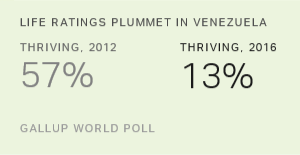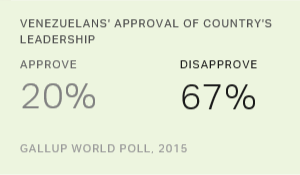Story Highlights
- Confidence in military and police at record lows
- 16% of Venezuelans confident in courts and judicial system
- 12% feel safe walking alone at night
WASHINGTON, D.C. -- Venezuelans expressed deep concerns late last summer with many of the institutions that are largely failing them now -- the local police, military and judiciary -- as their country teeters on the brink of anarchy. Venezuelans' confidence in all three institutions hit new lows last year and were among the lowest, if not the lowest, in the whole world in 2016.

Venezuelans' confidence in their police, courts and military have plummeted in the past decade -- most sharply since 2012 -- as Venezuela inches closer to civil war, fueled by a collapsing economy, food and medicine shortages, and a government clashing violently with some of its citizens. Nearly 70 people have died in the last two months as a result of protests and tensions with the government.
Confidence in Military Declines 44 Percentage Points Since 2010
While Venezuelans' confidence in their local police -- the most immediate force that could help them feel more secure -- sits at a record low, their confidence in the military, or the Fuerza Armada Nacional Bolivariana, is not much better. At 16%, confidence has dropped seven percentage points from last year and 44 points since the beginning of the decade.

Venezuelans in the last decade have generally looked up to the military more than the police, with confidence reaching as high as 62% in 2006, during the reign of President Hugo Chavez. The precipitous drop in confidence has occurred during President Nicolas Maduro's tenure. Maduro has ordered the military to turn on protesters recently, which has stoked unrest. At the same time, security forces have jailed at least 14 military officers on suspicion of treason for dissenting against Maduro.
Confidence in the Judicial System Plunging as Well
The judicial system has taken a hit in confidence since 2012 -- 51% of Venezuelans said then that they had confidence in their judiciary, compared with just 16% in 2016. At the beginning of this decade, a solid 54% had confidence, another sign of how rapidly the changes in Venezuela are occurring.

This collapse of confidence is likely related to Maduro's suspension of constitutional rights by declaring a state of emergency in 2016. In effect, Maduro now holds legislative and executive powers, while also holding judiciary power. The president is continuing a quest to hold a national assembly to rewrite the constitution. Recently, the Trump administration imposed sanctions on eight members of Venezuela's Supreme Court, after the court stripped the nation's democratically elected National Assembly -- controlled by Venezuela's opposition party -- of its power.
Venezuelans' faith in these institutions has deteriorated along with their sense of personal safety. Just 12% said they felt safe walking alone at night in their neighborhoods -- down by more than 70% from the 44% who said this in 2006. While there has never been a majority of Venezuelans who said they felt safe since Â鶹´«Ã½AV began asking this question, the reading in 2016 is the lowest in the world .
In terms of experience with crime, 2016 was the worst year in the past decade for Venezuelans. Nearly four in 10 (38%) said they had money or property stolen from them in the past year -- a new high. And one in six Venezuelans said they had a friend or relative murdered in the past year -- also a new high.
Bottom Line
A clear consensus is emerging among Venezuelans: They do not have confidence in the institutions meant to keep them safe. The shockingly low levels of confidence and beliefs about personal safety in 2016 are a direct result of a disastrous chain of events in the last four years in the South American nation. Venezuelans are saying they have no faith in the rule of law, and that there is no one to protect them or look out for them. In fact, many of these institutions may be working against them. In essence, they are taking that responsibility for their own safety on themselves.
These indicators are only likely to get worse rather than better in the next year, or until a resolution is achieved. It is a bleak picture for a country once rich in oil revenues and tourism.
These data are available in .
Survey Methods
Results are based on face-to-face interviews conducted with 1,000 adults aged 15 and older in Venezuela from July 7-Sept. 8, 2016. For results based on the total sample of national adults, the margin of sampling error is ±4.1 percentage points at the 95% confidence level. All reported margins of sampling error include computed design effects for weighting.
For complete methodology and specific survey dates, please review .
Learn more about how the works.



